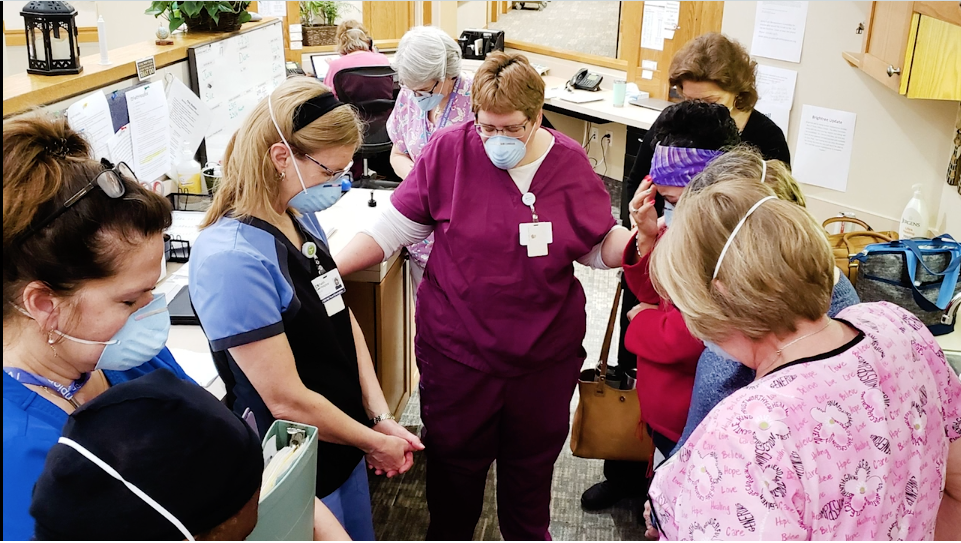Intake Team
Once a patient is referred to Faith Hospice, the first step is collecting their demographic and insurance information. Then, we work with the patient’s schedule to arrange the appropriate meetings with a social worker and a nurse. There are a number of schedulers involved to make sure things are done efficiently and always with compassion. The admissions team is often the first people that patients and/or their loved ones will talk to, and it is vital for them to get the process started smoothly during this difficult time.Hospice Social Workers
As an advocate for the patient, hospice social workers are an essential part of the hospice team. They might help fulfill a patient's end-of-life wishes or help a patient deal with the emotional aspects of late-stage illness. Bringing open-mindedness, empathy, advocacy, and problem-solving skills, hospice social workers extend their help to their patients’ loved ones as well. The focus is always on finding out what is most important for the patient and the most worrisome for the family. Once they are able to identify the main issues and challenges, social workers can help fill those gaps. It can be a number of things from more in-home care, advanced care planning, accessing resources, counseling, and looking for other opportunities to enhance a patient's quality of life.Hospice Aides
The role of the hospice aide is primarily to care for the patient’s personal care needs. Some of the things they help with include bathing, dressing, feeding, hair care, nail care, and oral care. Aides are with them as their care needs continually change, keeping other care team members updated while also providing companionship. Some examples include reading to the patient, taking them for a walk, and listening to their concerns. The one-on-one attention is key to the goal of improving the patient’s day, as well as providing some relief to other caregivers and family members.Hospice Doctor
The hospice doctor oversees the entire hospice care team, ensuring that the patient’s care wishes are honored, their goals are achieved, and that the rest of the care team is supported. Board-certified hospice care providers like Medical Director, Dr. Patrick Fitzgibbon (or, “Dr. Fitz” as his colleagues and patients come to know him as) play a critical role in developing and participating in their patient’s care plan “It’s about caring for mind, body, and spirit,” Fitzgibbon emphasized. “It's about whole-person care.” This comprehensive plan ensures that every member of the hospice care team, the patient, and their loved ones are fully aware of any action being taken. It varies from patient to patient, but a typical one includes:- Detailed interventions to manage pain and symptoms
- Measurable patient outcomes and goals from executing the plan of care
- The specific drugs and treatments necessary to carry out the plan
“Instead of focusing on the medical problems, we focus on what's important to each person."
Hospice Nurse
The skills and compassion of hospice nurses are seen throughout the patient’s end-of-life journey. They play a central role in the hospice care team handling many of the day-to-day tasks like patient care activities, managing pain and symptoms, providing medication, and educating loved ones on how to care for the patient. Being on the front lines puts hospice nurses in a unique position. Through their frequent visits, talks with the patient, and personally witnessing their trials and triumphs, they are vital in communicating a patient’s changing needs to the rest of the team.Hospice Chaplain
When someone is nearing the end of their life, emotional pain often appears. Anger, fear, frustration, and depression can affect not only the patient but their loved ones and other caregivers. A hospice chaplain can provide spiritual counsel and care regardless of religion or culture to help people find peace in this difficult time."A lot of people, when they face these hard times, it can rock them a lot. And what happens for us is that, especially as a chaplain, they give you permission to, not only walk alongside them, but try to calm their spirits, and their hearts, and their minds. That gives them peace just knowing they’re not doing it alone."
Volunteers & Volunteer Coordinators
Volunteers add another layer of care to what the clinical and spiritual teams provide. At Faith Hospice, we rely on many volunteers who selflessly give their time to serve. They get involved in many ways, including:- Offering companionship by sitting, playing games, walking, or reading with a patient
- Joining our 11th Hour volunteer team to support and pray with patients during their last hours
- Bringing music into someone’s home or providing pet visits
- Administrative tasks such as greeting our guests or office help
- Providing relief for caregivers
- Assisting families with household tasks (such as watering flowers or housekeeping)
- Capturing life memories and legacy creation through scrapbooking, audio recording, or journaling
- Service projects such as making handmade cards, weighted blankets, and fidget mats
- Sewing projects—quilts, pillowcases, and more
- Computer projects
- Our Cookie Ministry at Trillium Woods
“Our volunteers are such a blessing to patients and their families! Lonely folks receive companionship; patients who enjoyed music throughout their lives are energized by a serenade or a concert; family caregivers can leave for a dentist appointment, lunch date, or simple trip to the grocery store knowing that their loved one is not alone.”

